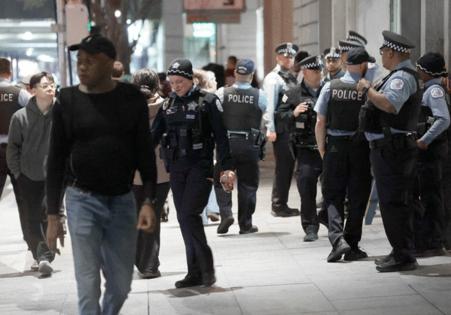Aldermen narrowly vote to give Chicago police power to set temporary teen curfews
Published in News & Features
CHICAGO — Aldermen granted Chicago’s police superintendent the power Wednesday to declare a teen curfew anytime, anywhere in the city, teeing up a likely veto by Mayor Brandon Johnson.
The highly contentious ordinance faced months of City Council debate before passing in a 27-22 vote. And Johnson, who has blasted it as “lazy governance” and unnecessary, must now decide if he will cast the first mayoral veto in decades to kill the policy.
“It has not worked,” Johnson said of curfews Tuesday, pounding the table during a news conference. “And now we’re doing stuff that works, and then they want to come up with another idea that has not worked. What sense does that make?”
During floor debate Wednesday, Johnson’s handpicked Finance Committee chair Ald. Pat Dowell pushed back on the mayor’s argument that aldermen should focus on investing in youth instead of passing the ordinance.
“I believe we can and should do both. I’m not down here doing lazy governance. I’m down here to actively work and do what is necessary to protect my community,” Dowell said. “Stopping these potentially chaotic and violent gatherings will help everybody.”
The mayor has so far avoided saying if he will veto the ordinance throughout its circuitous route through City Hall. The last mayoral veto occurred in 2006, when Mayor Richard M. Daley vetoed an ordinance that would have required “big-box” retailers like Walmart to pay wages of $10 an hour.
The ordinance would be required to garner support from 34 aldermen to overcome a mayoral veto, a high bar that it does not appear poised to meet.
Ald. Brain Hopkins, 2nd, first proposed the ordinance last year after a downtown youth gathering ended in violence and began to push it forward again in March after two similar gatherings culminated in high-profile shootings.
Hopkins first planned to target only downtown with an 8 p.m. curfew, two hours earlier than the long-standing citywide teen curfew. He then sought to give both Johnson’s deputy mayor for community safety and the police superintendent shared power to declare the pop-up curfews together.
All the while, progressive aldermen and civil rights groups blasted the curfew push as an unconstitutional and unfair crackdown harming teens. Ald. Angela Clay, 46th, argued aldermen were ignoring teen voices and underlying disinvestment that leads to chaotic gatherings.
“What we are doing right now is not listening to the young people of this city,” she told aldermen. “The issue that we are discussing here is a broader conversation that a lot of us are too afraid to have.”
Johnson criticized the early versions, but did not always take a clear side until Hopkins pushed forth a version giving Snelling the exclusive power to declare pop-up curfews.
Snelling, who would be required to consult others on any curfew and issue public warning 30-minutes before implementation, has loomed large over the debate as both supporters and opponents claimed to have his support. Hopkins said Tuesday Snelling had been calling aldermen to urge “yes” votes.
“Every one of those conversations ends with the superintendent saying, ‘I support this ordinance. I urge you to pass it,’” Hopkins said.
But Ald. Jason Ervin, 28th, said Snelling told Black Caucus aldermen Tuesday night that he does not need the powers the ordinance grants. Ervin added that he hopes Johnson will veto the measure.
Snelling offered a mixed response to the ordinance in court testimony last week. He said he would not use a “snap curfew” power to declare curfews shortly before they go into effect, but would use a power allowing him to declare curfews days in advance when police are forewarned of such gatherings.
The ordinance “would be used as a deterrent where, if we have that information days before, we would send out notifications to CPS, to parents,” he said. “This is going to prevent the possibility of violence.”
The superintendent added he would never agree to a measure targeting only downtown and said curfew violations are not criminal, meaning they would not result in arrests. But Snelling backed away from the debate Wednesday morning. In a statement to the Tribune, he said police “have always enforced the law at large gatherings and will continue to do so.”
“The curfew ordinance has become more a matter of politics than public safety. Given that this is a matter that sits within the City Council, I have no further comment,” he added without saying whether he will use the ordinance’s powers.
A coalition of groups opposing the ordinance called for the city to instead invest in youth jobs, violence prevention programs and safe, engaging activities for young people before the vote. The curfew ordinance could lead to teens being kicked out of parks and beaches, GoodKids MadCity organizer Reynia Jackson said.
“It isn’t fair and it isn’t equitable,” Jackson said. “What we need is healing. What we need is prevention.”
_____
(Chicago Tribune reporter Sam Charles contributed.)
____
©2025 Chicago Tribune. Visit at chicagotribune.com. Distributed by Tribune Content Agency, LLC.







Comments